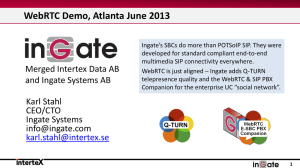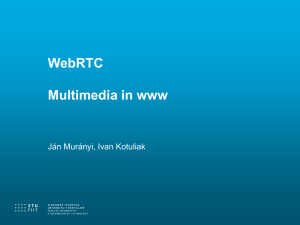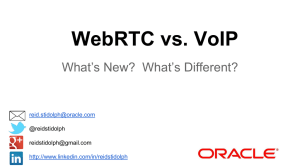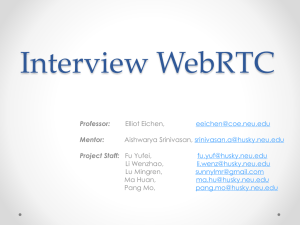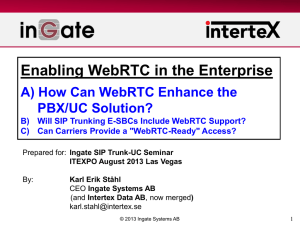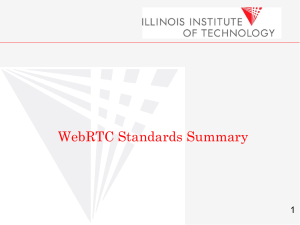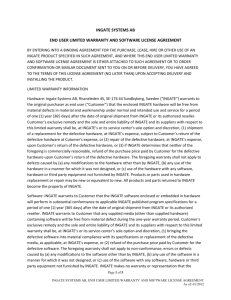D2-1 ICE Turn Stun and Security v1 06
advertisement
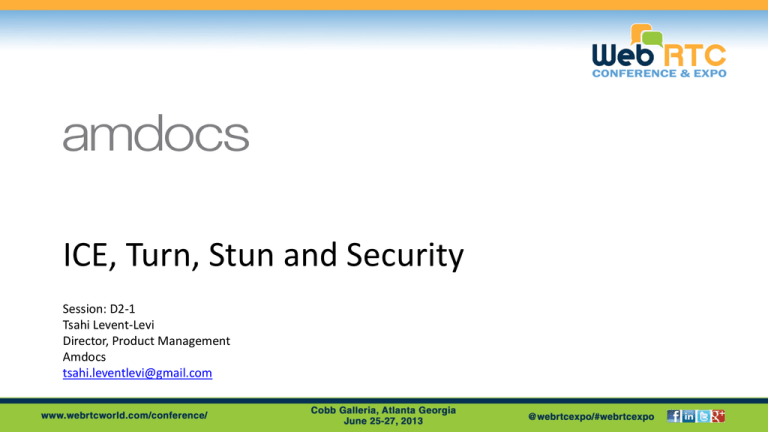
ICE, Turn, Stun and Security Session: D2-1 Tsahi Levent-Levi Director, Product Management Amdocs tsahi.leventlevi@gmail.com Session Presenters • Glen Gerhard – VP Product Management – Sansay • Karl Stahl – CEO/CTO – Ingate Systems • Richard Blakely – CEO – Influxis / XirSys 3 Glen Gerhard VP Product Management Sansay ggerhard@sansay.com Interactive Connectivity Est. Builds a candidate list for endpoints to use as available Uses direct path, STUN or TURN paths Direct is called Host Path Outside NAT path is Server TURN is called Relay Path Candidates provided by application server for each path Compatible with SIP endpoints at media layer Algorithm decided on candidate directives a=candidate:1 1 UDP 2130706431 10.10.1.11 8338 typ host a=candidate:2 1 UDP 1694498815 192.8.2.13 45664 typ srflx raddr 10.10.1.11 rport 8338 a=candidate:3 1 UDP 6130862446 64.97.22.36 53248 typ relay TURN Server Relay Server Host NAT STUN Client STUN Process Endpoints generate special signaling packets for STUN Protocol STUN Server NAT maps STUN packets per normal, seen at Server This information passed back to Client Bind And then passed Client to Application Server Provided to far end device for external relay Response: Server Candidates usually #2 after Host Sending lP:UDP Can be blocked by NAT/Firewall depending on type NAT Corporate firewalls often cause issues Firewalls becoming more restrictive. Percentage of calls that fail varies (10-15% +/- ?) STUN Client TURN Difficulties Application system does not control TURN server directly Creates a risk for DOS at media layer Encryption keys not known by TURN server So cannot be used for SRTP-RTP translation So cannot be used for transcoding Performance of media layer is not reported on call legs May be able to get end-end data, but not per call leg data ICE candidate checks can add to PDD on sessions Trickle ICE is useful but call set up is still delayed More Secure Approach Application Server Provide endpoints with one SDP Use media relay to secure and ensure path Relay Point RTC Client HTTPS RTC Client Media 8 API with Media Control Application controls media relay ports directly Full control of relay and security on ports Encryption keys can be passed for SRTP decryption Relay can now be used for transcoding SRTP to RTP; Opus to G711, G.722 Enables advanced applications such as streaming, speech req, conferencing and recording Permits CALEA function to be centralized ICE candidate can provide one candidate Reduce PDD and improve reliability Fault tolerant designs are possible with HA hardware Media Relay Trade Offs The application needs to understand the API Build API to be app friendly with JSEP or ROAP Media relay adds bandwidth at the relay site Adds cost to network build out (esp with video) Most networks today expect this B/W usage B/W costs low at colo sites, not true on local loop Off net calls to SIP will generally require media relay What feature set does your application require? What price enhanced security and ensured connectivity? Merged Intertex Data AB and Ingate Systems AB Karl Stahl CEO/CTO Ingate Systems info@ingate.com karl.stahl@intertex.se Ingate’s SBCs do more than POTSoIP SIP. They were developed for standard compliant end-to-end multimedia SIP connectivity everywhere. WebRTC is just aligned – Ingate adds Q-TURN telepresence quality and the WebRTC & SIP PBX Companion for the enterprise UC “social network”. ICE Means There is no WebRTC-SBC • ICE was developed and standardized for SIP, but not used much for SIP… • WebRTC has no SBC-alternative, it is end-toend (encrypted) • WebRTC Prescribes ICE, which uses STUN & TURN, negotiated in SDP. • Best: WebRTC is end-to-end and does not encourage application specific networks • Worst: The firewalls are unaware of what is being traversed – Or isn’t it? ICE is Complex - But it Will Work • ICE is complex, but yes, I believe it will work because there are only a handful of browsers. Implementations simply have to be compliant and compatible! • Concerns? • • • • Local TURN servers required – Or delays? Slow – Trickle ICE? Bigger and bigger SDP – Watch out! Does not penetrate restrictive enterprise firewalls. Tunneling over open TCP ports is no quality option • Security is otherwise OK. There is Excellent Privacy • Quality through firewalls unaware of the traffic type? UDP is required for real-time. Open TCP ports 80 (http) or 443 (https) are no good. Quality? From POTS to Telepresence – A Gigantic Step • WebRTC has the potential of telepresence quality: Opus HiFi sound and VP8 / H.264 HD video • Layer 4 QoS: UDP over TCP is not sufficient Pre- AM Radio 3,5 kHz to 20 kHz audio and 3,5 Mbps video • It is NOT “Just About Bandwidth” • Data crowded networks • Surf, email, file transfer fill the pipes • Carriers concerned – do advanced networks • But out comes RJ11 = POTS Quality… • Still, Internet has the largest bandwidth • We just need to Prioritize - Level 3 QoS RJ11 A Novel View on ICE – Q-TURN Knock-knock; Give my media a Quality Pipe • Regard ICE as a request for real-time traffic through the Firewall. Interpret the STUN & TURN signals in the Firewall • Have the STUN/TURN server functionality IN the Firewall and setup the media flows under control • Security is back in the right place - The firewall is in charge of what is traversing • Enterprise firewall can still be restrictive Q-TURN Enables QoS and More: • • • • Prioritization and Traffic Shaping Diffserve or RVSP QoS over the Net Authentication (in STUN and TURN) Accounting – Payload Type is seen Q-TURN as the Carrier Broadband Delivery Sell a “WebRTC-Ready” Access! • Why only deliver Best Effort Data? • Quality Traffic - prioritized realtime traffic within the same pipe is highly valuable, but cost no more bandwidth to produce! • OTT can be more than data delivery. Telepresence in your pocket! SIP Connect 1.1 Internet+ Q-TURN at the Carrier Demarcation Points • Mobile (replace the DPI behind the Cell Tower) • Enterprise and SMB delivery • Residential delivery – Fits embedded CPEs Ingate’s Live Demonstration at Display Table 29 Q-TURN Relies on Standardized ICE It is for WebRTC and other protocols using ICE • Quality for End-to-end WebRTC • Even for SIP if ICE is used (But our product also includes a SIP proxy based E-SBC) Company Web Server Transcoding is different – That is a Gateway function • Ingate’s WebRTC – SIP Gateway is a PBX / UC Companion based in Ingate’s SIP Trunking E-SBC • It brings WebRTC into the “PBX / UC Social Network” infrastructure LAN media WS SIP XirSys provides IaaS for WebRTC including TURN server hosting, professional support, client ecosystem, and much more. Richard Blakely CEO Influxis / XirSys richard@influxis.com WebRTC Streaming Basics STUN SERVER P2P Client A Client B TURN Basics Provides relays for data transfer between participants using NAT traversal TURN SERVER Client A Client B Streaming Basics Provides one-to-many and many-to-many transmission of data Client E Client D STREAMING SERVER Client C Client A Client B TURN for Streaming Record Media Innovation Layer, Transcode & Package Client E Client A TURN SERVER Client D STREAMING SERVER Client C Client B Client B Find Out More • Visit us at: www.xirsys.com • BETA testers, email: beta@xirsys.com • Direct email: richard@xirsys.com Questions 1. When is a TURN server required? 2. What Firewall issues cannot be circumvented? 3. Do these techniques compromise security and is the proposed firewall combined with the TURN server a solution to that? 4. Do they allow security to be bypassed? 5. What kind of Quality improvements could be added considering the TURN server as part of the firewall? 6. What are the performance and latency issues of a STUN or TURN implementation? 24
